Contact center of the Ukrainian Judiciary 044 207-35-46

Despite the war, the temporary occupation of part of the territory of Ukraine, the departure of citizens, the internal displacement of people within the country and the relocation of businesses, the demand for courts in the second year of the war corresponds to the demand for courts in the pre-war years.
This was emphasised by Stanislav Kravchenko, President of the Supreme Court, at the Supreme Court Plenum, which discussed the results of the judiciary's work over the past year and outlined priorities for 2024.
According to the President of the Supreme Court, in 2023 the judiciary operated under martial law, the energy crisis, missile attacks, funding cuts, excessive workloads and staff shortages. At the same time, it has addressed many of the challenges facing the judiciary.
Thus, in January 2023, a long-awaited event took place - the authorised composition of the High Council of Justice (the HCJ), which had been dysfunctional for almost a year, was formed. The HCJ held a competition for the positions of members of the High Qualification Commission of Judges of Ukraine (the HQCJU), which did not exercise its powers since autumn 2019. And in June 2023, the HQCJU started working.
"We all hope that the activities of these two bodies will lead to the actual filling of vacancies in the courts in the near future. Today, there are already positive developments: The HQCJU is holding a competition to fill 560 vacant positions of judges in local courts, and last week the Commission began recommending the first winners of this competition for appointment as judges," said Stanislav Kravchenko.
The President of the Supreme Court paid particular attention to the statistics on the number of cases received by the courts of all instances, which are impressive. Last year, the courts received almost 4.5 million cases and documents. This is 55% more than in 2022 and slightly more than in 2021. The number of cases filed in local courts totalled 3.8 million in 2023, which is 55% higher than in 2022 and exceeds the 2021 data for some indicators. The number of cases filed with the courts of appeal also increased by 62% compared to the previous year, exceeding the figures for 2021.

"The number of cases reviewed is also impressive," stated Stanislav Kravchenko. For example, local general courts dealt with 2.9 million cases, district administrative courts with almost 590 thousand cases, local commercial courts with 179 thousand cases and courts of appeal with a total of 537 thousand cases.
In addition, for all types of jurisdiction, the figures for 2023 are significantly higher than those for 2022, and in some cases higher than those for 2021. Last year there were 1 million 40 thousand administrative cases, 283 thousand commercial cases, 1 million 245 thousand criminal proceedings, 1 million 505 thousand civil cases and 1 million 34 thousand cases of administrative offences pending before the courts.
"Despite the war, the temporary occupation of part of the territory of Ukraine, the departure of citizens, the internal displacement of people within the country and the relocation of businesses, the demand for courts in the second year of the war corresponds to the demand for courts in the pre-war years," the SC President noted.
According to him, a characteristic feature of the past year has been the significant number of judges who have resigned. The main reasons are fatigue, burnout, working under constant stress, etc. 325 judges were dismissed in 2023. This means that the number of cases is increasing significantly while the number of judges is decreasing significantly.
Regarding the activities of the Supreme Court, Stanislav Kravchenko emphasised that they exhibit the same trends as the entire judicial system. This includes an increase in the number of cases compared to the previous year and a focus on meeting the indicators for 2021. The Supreme Court received 86,190 cases for consideration, of which 86,160 were considered. At the same time, the total number of Supreme Court judges is 154, and 24 Supreme Court judges resigned in 2023. The average workload per judge is 45 cases per month, or 542 cases per year.
In 2023, the Supreme Court resolved a significant number of problems arising in court practice, contributing to the uniformity of case law.
In terms of general trends, the Supreme Court's case law has seen a significant decrease in the number of cases involving the determination of court jurisdiction. There are also fewer problems with the application of the provisions of the Criminal Code of Ukraine.
In addition, the uniformity of case law is ensured in disputes arising in connection with the war: on jurisdiction and the procedure for obtaining compensation for property forcibly confiscated (mobilised) under the legal regime of martial law; on the impossibility of suspending the proceedings on the grounds of the plaintiff's membership in the Armed Forces of Ukraine if he insists on continuing the proceedings; on establishing the fact of living in an unmarried family with a deceased serviceman.
Literally in the first months after the full-scale invasion, the Supreme Court gave its opinion on the judicial immunity of the aggressor state, concluding that such immunity could not deprive Ukrainian citizens of the right of access to the courts in disputes relating to compensation for damage caused by the armed aggression of the russian federation. Subsequently, a number of other positions were formulated in these legal relations. And in 2023, in the context of commercial litigation, it was stated that the aggressor state could be a defendant in the relevant category of cases.
In the field of civil litigation, the Supreme Court resolves a number of labour and family disputes, taking into account the particularities of martial law. In the context of a full-scale war, inheritance issues have become particularly relevant, and the Supreme Court has formulated many legal opinions on these legal relationships.
In the criminal proceedings, important conclusions have been formulated regarding criminal prosecution for high treason, encroachment on territorial integrity and inviolability, and the imposition of punishment for justifying the armed aggression of the russian federation. A number of legal issues have been resolved in cases involving corruption and general crimes that became relevant during the war.
"Along with the consideration of cases by the Supreme Court, it is equally important to ensure communication with the courts and judges of the first and appellate instances. It is necessary to proactively discuss and resolve the problems that are already arising in the courts today, without waiting for them to be submitted to the Supreme Court," the SC President stressed.
Another important area of activity for the judiciary is communicating with the public and increasing public confidence in the courts. In the year 2023, the justice system faced some unfortunate moments. This primarily concerns the unprofessional behaviour of judges and their actions that contradict the high standards expected of a judge. The judicial community, including the Supreme Court, gave a timely and categorically negative assessment of such actions. However, the actions of certain individuals cannot characterise the judiciary as a whole.
In addition, the general perception of citizens' trust in the courts is formed on the basis of information available in the media, social networks, etc.
Therefore, it is important to engage in a dialogue with civil society, be transparent, and communicate court proceedings in a clear and accessible language. The war should not hinder this. After all, society strives for a fair trial, but it is not always aware that such a fair trial is not a fantastic future, but a reality that exists today. Trust in the judiciary is a value that we must pursue together," said Stanislav Kravchenko.
The speaker paid special attention to the issue of judicial independence. In particular, it concerns the searches conducted in the Dniprovskyi District Court of Kyiv, unacceptable statements by certain representatives of the central executive authorities that in some way violate the norms of professional ethics.
Stanislav Kravchenko also noted that everyone has been waiting for the full launch of the Unified Judiciary Information and Telecommunication System (UJITS) for six years. He thanked the Parliament for the draft law on compulsory registration in the E-court and noted that the legal conditions for the functioning of the UJITS are quite good, so it is now up to the judiciary to take the floor. And this year we need to take a step forward in the implementation of e-justice.
The President of the Supreme Court expressed his gratitude to international partners - the Council of Europe, the European Union, the United States of America, relevant OSCE projects and others - for supporting Ukraine in this extremely difficult time. In 2023, our country continued to receive expert, technical, military and humanitarian assistance from most countries in the world.
The President of the Supreme Court also outlined the main tasks for 2024, including the staffing of the courts, the consistency and unity of the Supreme Court's jurisprudence, the interaction and joint resolution of legal issues with the courts of first instance and the courts of appeal, and the strengthening of communication with society.
At the end of his speech, Stanislav Kravchenko thanked the Ukrainian judges and court staff for their great contribution to the effective and fair administration of justice in Ukraine. The SC President also expressed his gratitude to the soldiers who defend Ukraine and who make it possible for the country to exist as a democratic and legal state with its own Constitution, as opposed to tyranny and dictatorship, and for the courts to continue to work to guarantee citizens access to justice.
The results of the work of the Grand Chamber of the Supreme Court in 2023 were presented by Vitalii Urkevych, Secretary of the Grand Chamber of the Supreme Court. According to him, during the reporting period, as in previous years, the Grand Chamber of the Supreme Court solved important tasks related to the development of a uniform practice of applying the law.

In 2023, the Grand Chamber of the Supreme Court received 609 procedural applications, complaints and cases, of which 36% related to administrative cases, 13% to commercial cases, 16% to criminal proceedings, and 35% to civil cases. Overall, the number of procedural appeals in 2023 increased by 35% compared to 2022.
Last year, the cassation courts referred 154 cases to the Grand Chamber of the Supreme Court, which is 15% more than in 2022. Approximately 40% of the cases were transferred due to the need to deviate from the legal conclusions of another cassation court, in 30% of the cases the reason for the transfer was an exceptional legal problem, in 20% of the cases the need to deviate from the legal conclusions of the Grand Chamber of the Supreme Court and in 10% of the cases the violation of jurisdictional rules regarding the subject matter or entity.
Regarding the indicators of appeal proceedings, Vitalii Urkevych said that in 2023, the Grand Chamber of the Supreme Court received 133 appeal complaints (22% of all complaints received by the Grand Chamber in the reporting period), of which 121 appeal complaints concerned disputes over challenging acts, actions or omissions of the Verkhovna Rada of Ukraine, the President of Ukraine, the High Council of Justice, and the High Qualification Commission of Judges of Ukraine.
Last year, the Grand Chamber of the Supreme Court also had eight appeals pending against decisions of the High Council of Justice (HCJ) (including the balances from previous years), which were taken as a result of the consideration of appeals against decisions of the HCJ Disciplinary Chambers. Two of these appeals have been reviewed, while the others are ongoing.
In 2023, the Grand Chamber of the Supreme Court considered 41 applications for review of court decisions under exceptional circumstances: six in administrative cases, one in commercial cases, 30 in criminal proceedings and four in civil cases.
In total, the Grand Chamber of the Supreme Court considered 485 procedural appeals and issued 183 decisions on the merits during the reporting period.
In addition, Vitalii Urkevych recalled the most important judicial decisions of the Grand Chamber of the Supreme Court in the past year. These include resolutions containing legal conclusions, in particular on the correlation and application of statutes of limitations provided for in various parts of Article 49 of the Criminal Code of Ukraine; the possibility for individuals to file a court action using a qualified electronic signature via an official e-mail address; the extension of the provisions of Article 625 of the Civil Code of Ukraine to cases of delay in the execution of a court decision confirming the state's financial obligation to compensate for damages; exemption of an individual defendant from the payment of court fees when filing an appeal or a cassation appeal.
According to the Secretary of the Grand Chamber, there have been significant changes in the composition of the Grand Chamber over the past year due to the retirement of judges and the expiry of the term for which they were elected to the Grand Chamber. Vitalii Urkevych also spoke about the further cooperation between the Grand Chamber of the Supreme Court and the Scientific Advisory Council of the Supreme Court. In 2023, the judges of the Grand Chamber of the Supreme Court prepared 27 addresses to the experts of the Scientific Advisory Council on the preparation of scientific opinions on the application of legal norms and received 111 scientific opinions.
"The work of the Grand Chamber over the past year can, in my view, generally be described as effective, as evidenced by the fulfilment of its principal task of ensuring the unity of the case law. High quality and persuasive judgments, ensuring the unity of case law in order to guarantee the rule of law, remain the priorities of the Grand Chamber," Vitalii Urkevych concluded.
Viktor Kapustynskyi, Chief of Staff of the Supreme Court, spoke about the activities of the Supreme Court's Staff and the implementation of the Supreme Court's 2023 budget programme.
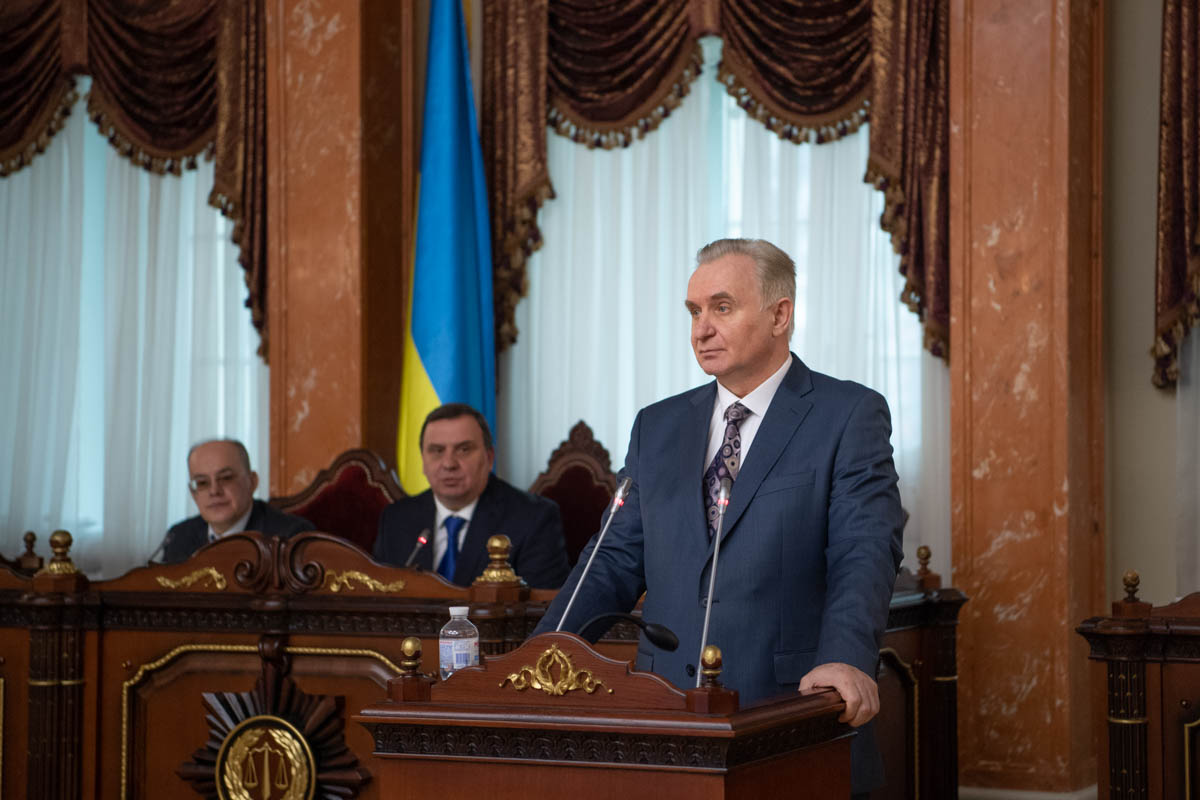
First of all, he emphasised that over the past year, the employees of the Court's Staff ensured the proper organisational level of functioning of the Supreme Court as a state body in accordance with the tasks set out in the Law of Ukraine "On the Judiciary and the Status of Judges" and the functions provided for in the Regulations on the Staff of the Supreme Court.
Viktor Kapustynskyi highlighted the main results of the work of the Supreme Court's Staff in the areas of analytical, legal, documentary, information technology, financial, human resources, procurement support, communications and other areas.
In particular, 94 reviews were prepared and published in 2023 based on the results of the systematisation of case law. Additionally, last year, the Supreme Court prepared a review of the case law of the Court of Justice of the European Union while continuing to prepare reviews of the ECHR case law. This area of work is extremely important in the context of European integration. Last year, we also updated the functionality of the Supreme Court's Legal Position Database and improved its search capabilities using artificial intelligence.
"I would also like to highlight a promising area - at the end of the year, by the sixth anniversary of the Supreme Court, the Supreme Observer portal of modern law was launched," added the Chief of Staff of the Supreme Court.
Regarding documentation management, Viktor Kapustynskyi noted that the turnover of procedural and standard workflow documents in the Supreme Court in 2023 amounted to about one million documents.
Among the significant achievements of the past year was the digitalisation of document management and archives. According to Viktor Kapustynskyi, the share of electronic document flow in non-procedural documents has already reached 80%. "Without a doubt, the introduction of the Electronic Court and other subsystems of the UJITS into our automated systems, the quality support of these integration processes and the provision of an adequate level of support to all users remains a priority," he stressed.
The Chief of Staff of the Supreme Court stated that the implementation of the Supreme Court's budget was carried out in accordance with the budgetary legislation, taking into account the principles of efficiency, effectiveness, publicity and transparency, and exclusively for the purposes determined by the budgetary allocations. However, due to a shortfall in court fees and russia's armed aggression against Ukraine in 2023, it was not possible to realise capital expenditures to complete projects started in previous years. In fact, by the end of last year, revenues from court fees amounted to UAH 456 million (only 61% of the plan).
Viktor Kapustynskyi specifically pointed out that the Financial and Economic Department had processed a significant number of applications from Supreme Court judges to transfer part of their judicial remuneration to support the Armed Forces of Ukraine. The total amount of such deductions since the beginning of the full-scale invasion is over UAH 468 million.
The human resources policy was also effective. In total, the Human Resources Department of the Supreme Court processed and prepared more than nine and a half thousand orders and directives last year.
According to the Chief of Staff, the Supreme Court adhered to the principle of information transparency in the area of information and communication. The Communication Unit of the Supreme Court responded promptly to challenges and provided the public with high quality, complete and substantiated information on situations related to the work of the Court.
The Staff of the Supreme Court directed a lot of efforts to improve the work of the Court's information services and ensure comfortable conditions for visitors to the Supreme Court.
In general, the Staff of the Supreme Court took appropriate measures to ensure support for procurement, classified activities, internal audit, personal military records and reservations for persons liable for military service.
Despite all the challenges of 2023 - and there were many of them - the work of the Staff of the Court was effective. Much effort has been made to ensure the proper organisation of court hearings, creating comfortable and safe conditions for judges, employees of the Staff and visitors to the Supreme Court.
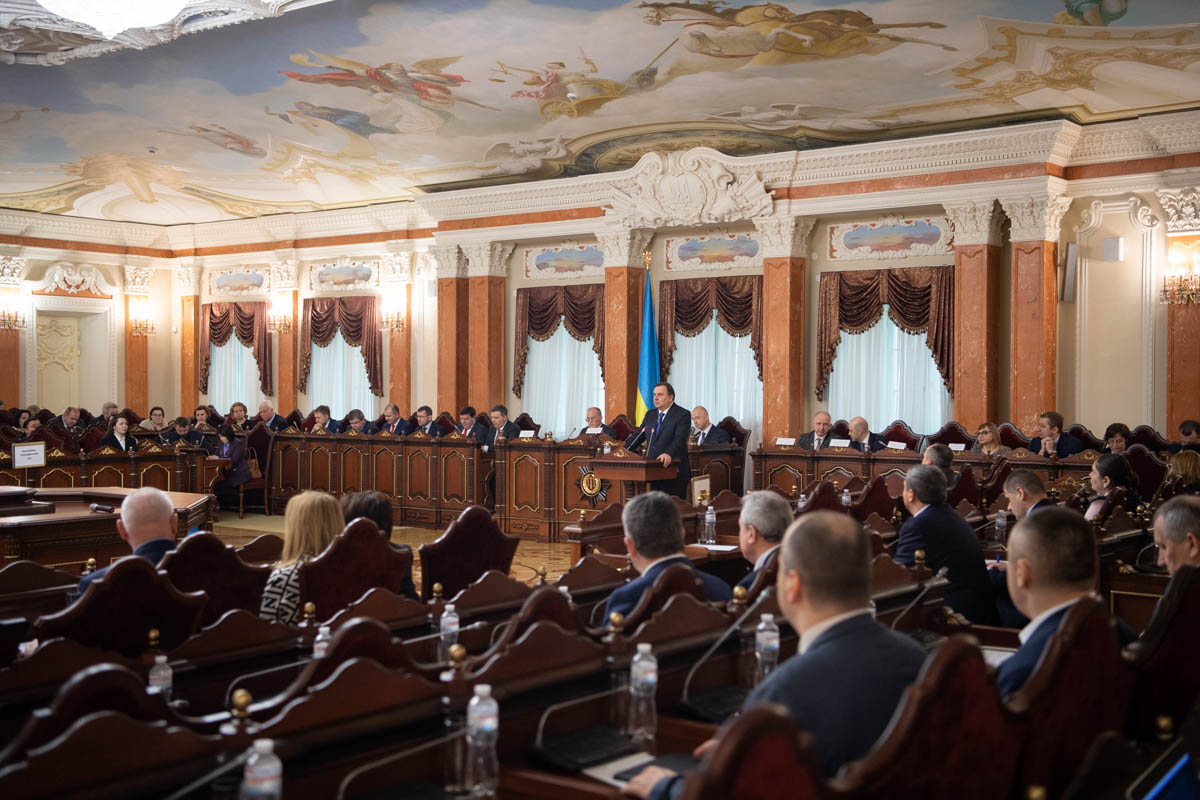
Unfortunately, due to the announcement of an air raid alert during the speech of the Chief of Staff, it was not possible to voice some more important information about the activities of the Staff of the Court in 2023. In addition, over the past year, sections of the Court's official website have been structured and optimised, a new voice menu has been launched in the SC Information Centre, and a room for trial participants has been set up in the SC Criminal Cassation Court building. In addition, in 2023, the General Reception Office for Citizens resumed its work at the Civil Cassation Court of the Supreme Court.
In addition to their main duties, representatives of the Supreme Court were actively involved in charitable and voluntary activities: they wove camouflage nets, became blood donors, participated in the restoration of houses damaged by enemy shelling, etc.
The Plenum also approved amendments to the staffing table of the Supreme Court Staff due to changes in the number of judges of the Supreme Court. In addition, the following retired Supreme Court judges were honoured for their long-term, conscientious and irreproachable work, professional achievements and significant personal contribution to the work of the Supreme Court: Svitlana Vus, Nadiia Danylevych, Vasyl Ohuretskyi, Volodymyr Selivanenko, Valerii Sukhovyi, Valentyna Shchepotkina and Oleh Mohylnyi.
 |
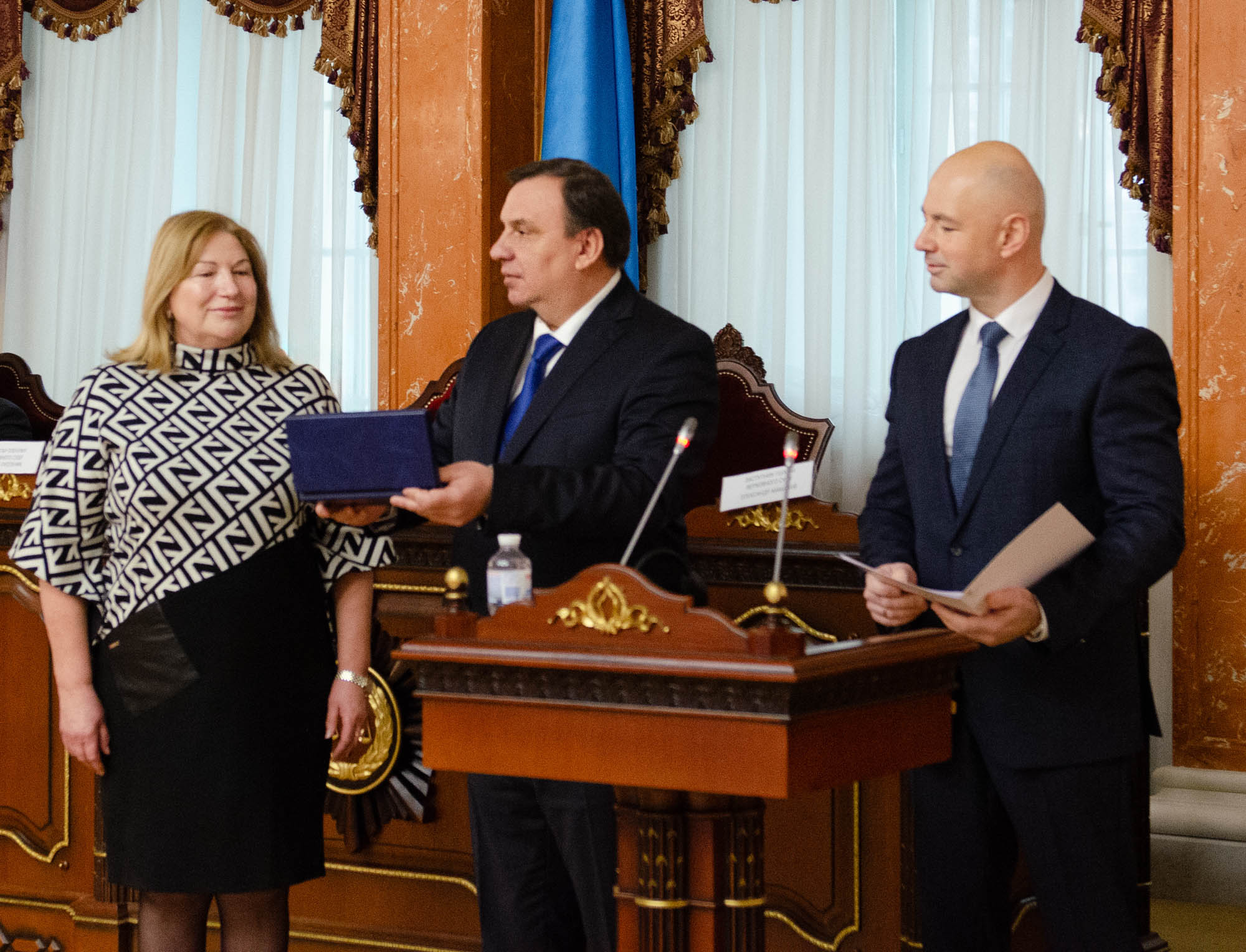 |
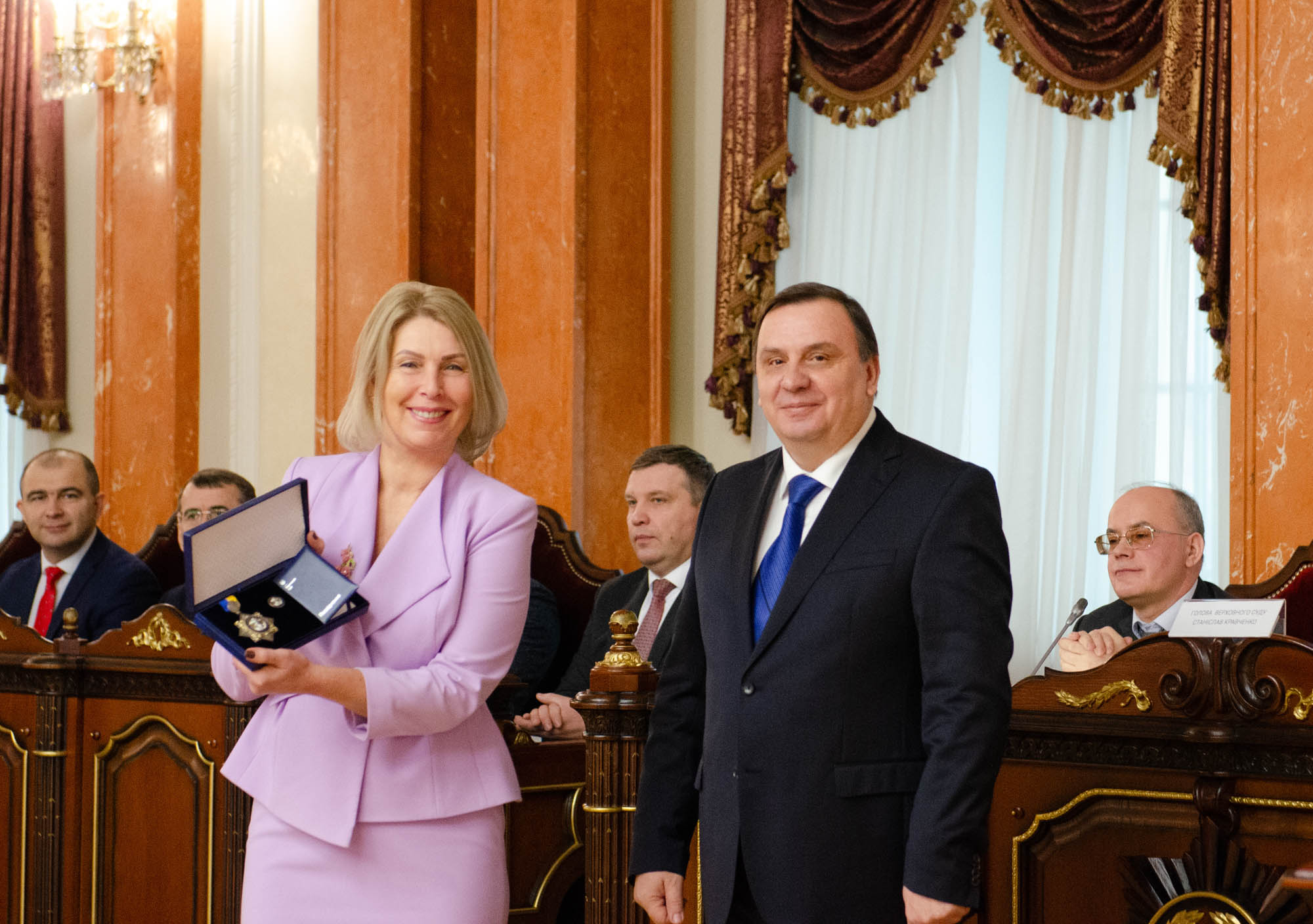 |
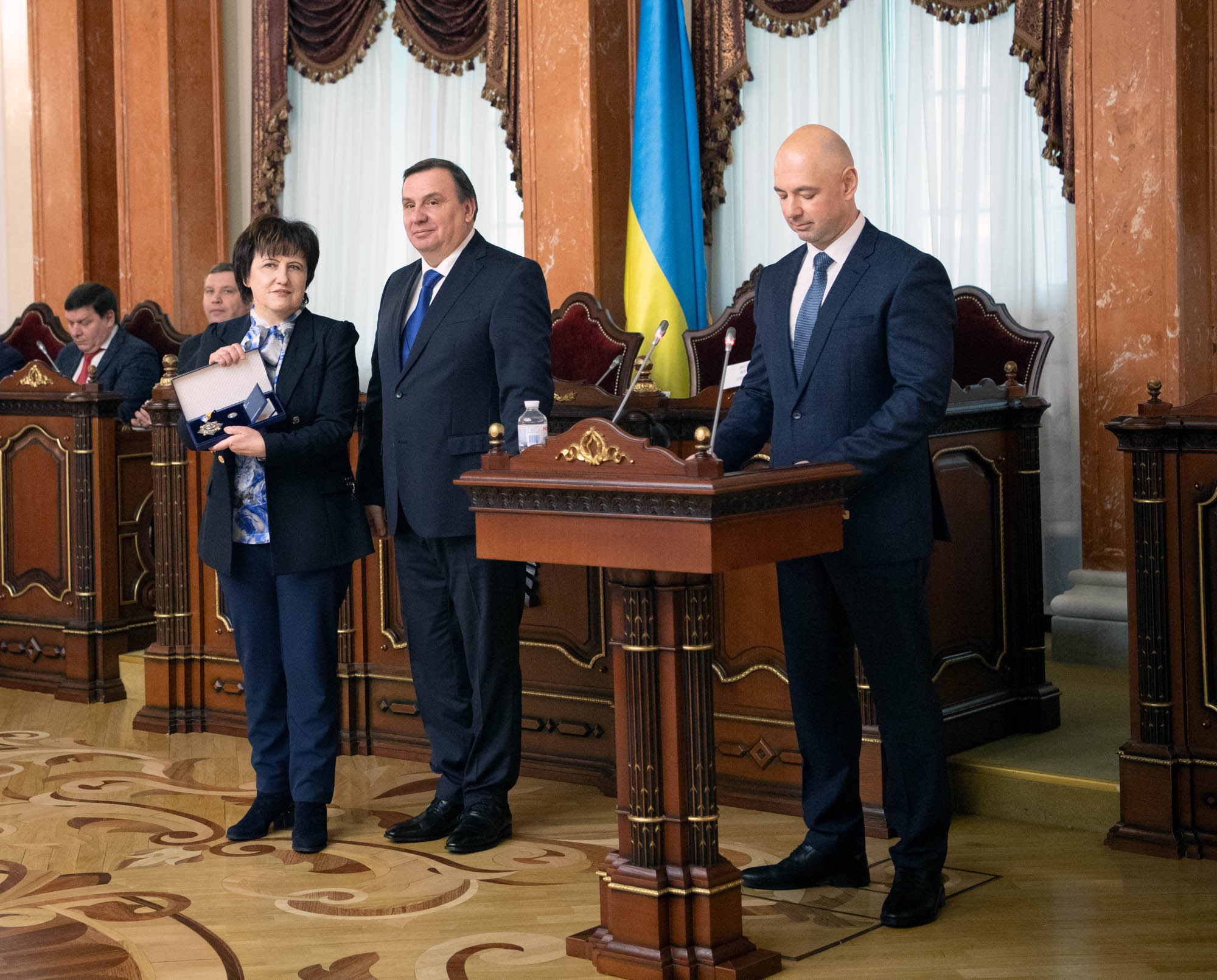 |
 |
 |
 |
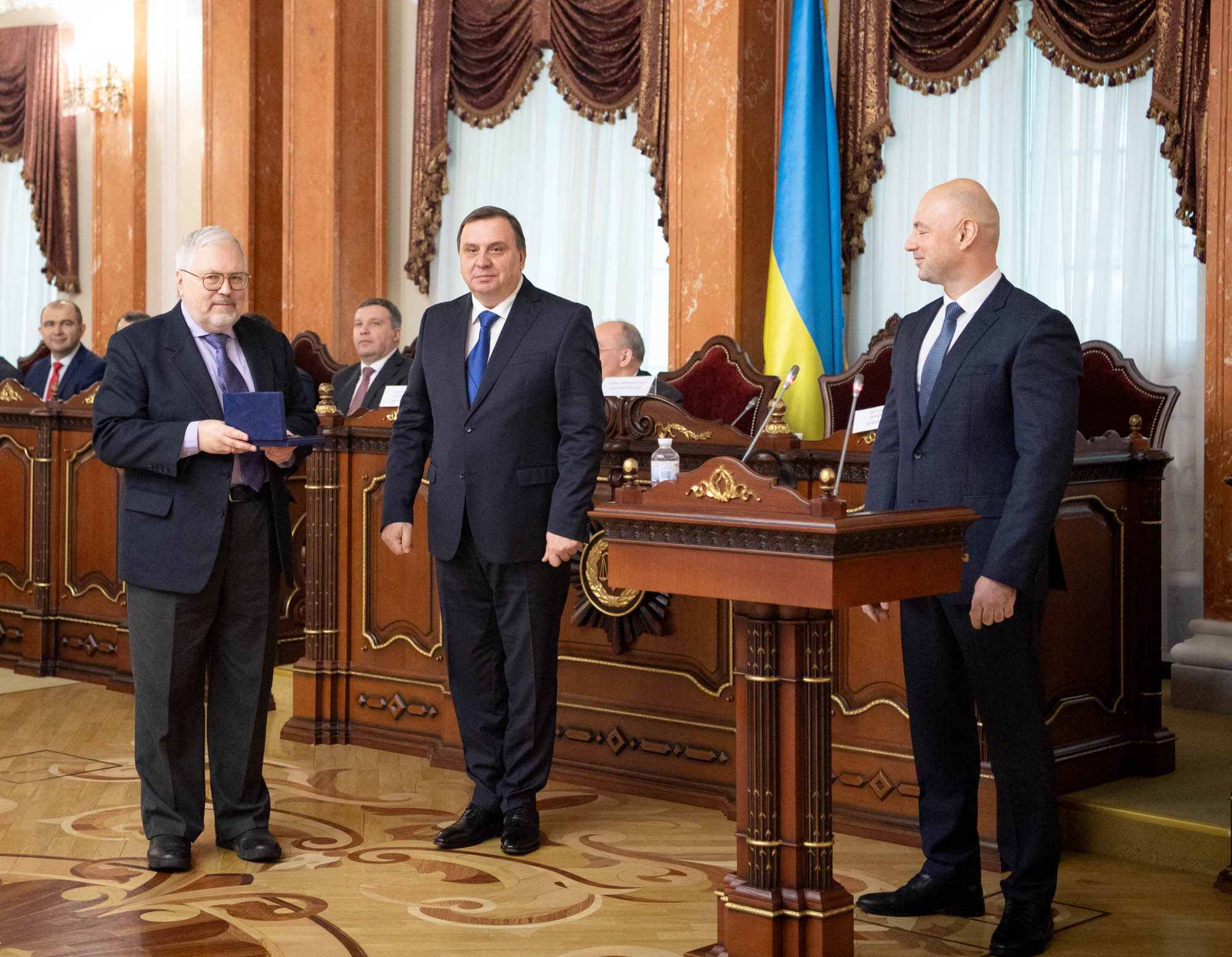 |